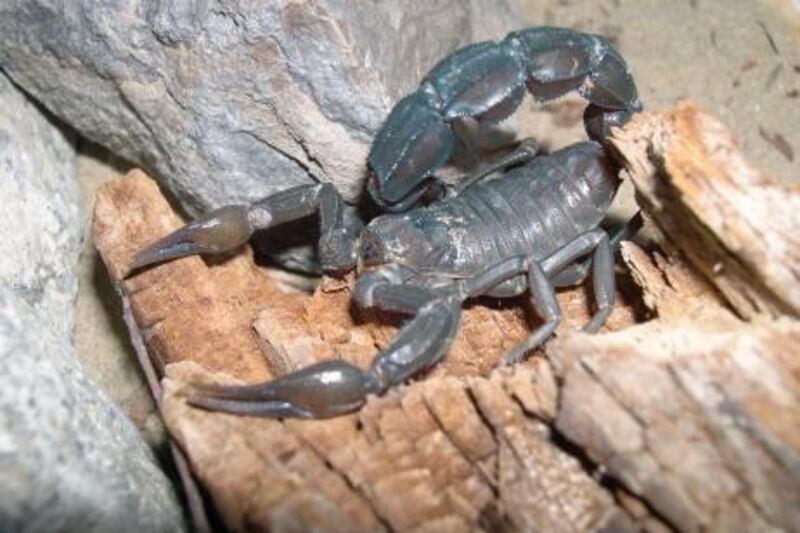ABU DHABI // The sands of the UAE hide many dangers - vipers, spiders, scorpions and other creepy-crawlies.
Some are quite prepared to sink their venomous fangs into the flesh of unwitting intruders, while others that look deadly are all show.
Special report: The Desert Survival Guide
The desert is a tough place to live. For generations, people survived through the UAE's sweltering summers by managing to eke out limited and hidden food, water and shelter. Our reporters look at how they managed it, what they ate – and how those secrets of survival still affect the lives of ordinary Emiratis today.
[ More from The National on desert survival ]
Experts warn against walking barefoot in the desert and confrontations with native creatures, but they say most animals will only attack if they feel vulnerable.
"The best policy is to be aware of your surroundings and if you see a snake or animal, avoid it," says Dr Reza Khan, the director of Dubai Zoo. "Still, before you go into the desert it is good to know what you may find out there."
The biggest risk to health comes not from snakes or scorpions but ants, the bite of which can cause severe allergic reactions including blocked airways.
Samsun ants, which are between 4mm and 6mm long and live mostly in grassy areas, have been linked to several deaths from asthmatic reactions. Fire ants can cause similar symptoms.
"People tend to think of dangerous monsters that live in the desert but what causes far more deaths are ants and stings that can cause anaphylactic shock," says Dr Drew Gardner, a desert ecologist and zoologist, and professor of Arabian ecology at Zayed University.
"Being a low-density area in terms of the food chain, snakes and other creatures are few and far between."
Experts noted these pests to look out for:
Snakes
The saw-scaled viper, the deadliest species of snake found in the UAE, is named after the rasping sound its scales make.
Its haemotoxic venom attacks the walls of blood vessels and can cause permanent kidney damage if not treated immediately.
If bitten, a victim should immobilise the limb as if it were broken and go to a hospital immediately, Dr Gardner says.
"Normally the venom will be deposited into the tissue and not the blood, and to move through the lymphatic system it would need muscle movement," he says. "If the area is immobilised, the venom will stay put for longer."
Most hospitals carry anti-venom treatments. Dr Gardner says some people carry supplies of anti-venom but he does not recommend it as it has to be cooled, which is difficult while travelling, and could cause a separate allergic reaction.
The best way to identify any type of viper is by the proportions of their body - typically small and heavily based with a larger head and narrower neck.
Another notably menacing species is the Arabian horned viper, which has small horns above its eyes. It has a powerful venom but is not usually life-threatening.
Other snakes carry dangerous venom in places such as fangs at the back of the mouth and behind the eyes, making them relatively harmless.
Scorpions
There are about 25 species of scorpion in the UAE, two of which are known to release venom that can lead to nausea, shock and irregular heartbeat.
They are the fat-tailed scorpion, which is large and black, and the deathstalker, a yellowish brown species that has a white or pale segment beneath its sting.
The African black-tipped scorpion is among the less dangerous species, says Dr Mohammad Al Deeb, the assistant professor of entomology at UAE University.
Spiders
"All spiders have got some kind of venom but most are harmless to us, with venom that works on small insects and mammals," says Dr Khan.
Dr Al Deeb says common UAE desert spiders include the comb-footed spider, ground-hunting spiders, giant crab spiders and wolf spiders, none of which pose serious threat.
While redback spiders are feared in other parts of the world, the arachnids seen with red stripes running down their back in back gardens across the UAE are unlikely to be the same creature, experts say.
Wild animals
Foxes or bats can carry rabies, although there is little evidence of outbreaks in the UAE, Dr Gardner says.
Wolves, leopards and hyenas have been known to wander the desert, although encounters with them are rare.
"Any kind of fox or stray dog behaving strangely should be avoided, as well as any smaller animal, because it is impossible to know what they could be carrying," Dr Gardner warns.
econroy@thenational.ae






